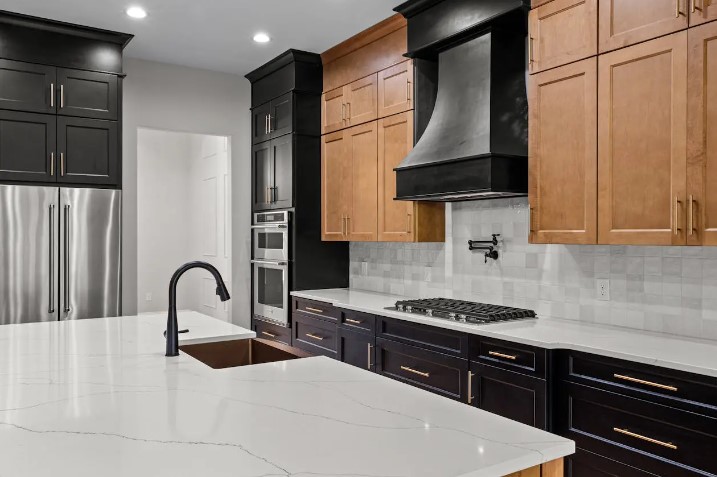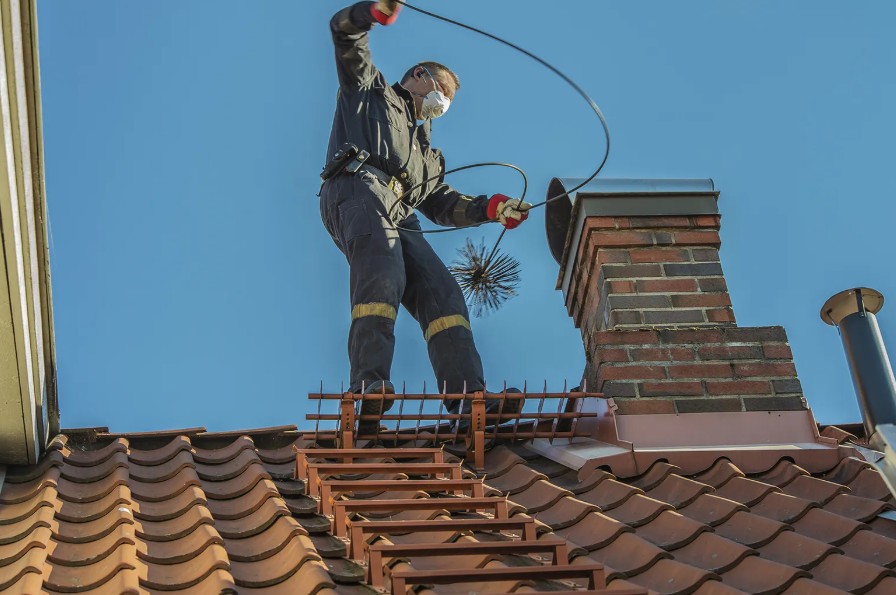
Choosing the right kitchen countertop is a significant decision that goes beyond aesthetics. Countertops not only serve as a workspace but also influence your kitchen’s overall functionality, durability, and value. From food prep to hosting gatherings, the right countertop can enhance how you use your kitchen every day. With various materials available—granite, marble, quartz, wood, laminate, and more—each option brings its own set of pros and cons. Knowing what each material offers in terms of durability, maintenance, cost, and design compatibility will help you make a choice that aligns with your lifestyle and budget.
1. Introduction to Choosing Kitchen Countertops
1.1 The Importance of Countertop Choice
Countertops are more than just surfaces for cutting, mixing, and setting down hot pots. They play a significant role in your kitchen’s style and functionality. High-traffic kitchens require materials that can handle heat, scratches, and stains, while households focused on aesthetics might prioritize a countertop’s look and texture. Additionally, countertops can impact your home’s resale value, with premium materials like quartz or granite often adding to the appeal. Making an informed decision on your countertop material will influence your kitchen’s look, ease of use, and value for years to come.
1.2 Understanding Your Kitchen’s Needs
Each kitchen has unique demands, and the choice of countertop should reflect how you use the space. A bustling family kitchen, for instance, might benefit from a highly durable, low-maintenance material like quartz, which can withstand spills and heavy use. For lighter cooking, materials like marble or butcher block that require more upkeep might still work well if the look is worth the extra care. Considering how much cooking you do, how often you clean, and the design you prefer will help pinpoint a countertop material that aligns with your lifestyle.
2. Popular Types of Kitchen Countertop Materials
Choosing a kitchen countertop material can be overwhelming with all the options available. From durable natural stones to synthetic and eco-friendly materials, each type brings its own charm and functionality to your kitchen. Here’s a closer look at some popular choices and what makes them stand out.
2.1 Granite and Marble Countertops
Natural stone countertops like granite and marble are prized for their beauty and durability. Granite is known for being one of the toughest countertop materials, resistant to scratches and heat, making it perfect for a high-use kitchen. It also comes in various colors and patterns, allowing homeowners to find something that fits any design scheme. Marble, on the other hand, is slightly softer and more porous but offers a unique, polished appearance with distinctive veining. While beautiful, marble may require more care, including regular sealing to prevent stains.
2.2 Engineered Quartz and Solid Surface
Engineered quartz is a top choice for many homeowners due to its durability and low-maintenance nature. Made from natural quartz crystals mixed with resin, quartz countertops are non-porous, making them resistant to stains, scratches, and bacteria. Solid surface materials, such as Corian, provide a seamless look and are available in a wide range of colors and patterns. While not as heat-resistant as granite, solid surface countertops are repairable, meaning scratches can be buffed out if needed. Both options offer versatility and require less maintenance compared to natural stone.
3. Factors to Consider When Choosing Countertops
When choosing a countertop, considering durability, cost, maintenance, and style can help narrow down options. These factors will determine how well your countertop meets your kitchen’s needs and how it looks and performs over time.
3.1 Durability and Maintenance Needs
Durability is a key consideration, especially for households with high kitchen activity. Granite is known for its strength, heat resistance, and ability to withstand wear and tear, though it requires periodic sealing. Quartz offers a lower-maintenance alternative, as it is non-porous and does not require sealing. In contrast, marble, while luxurious, is prone to scratches and etching from acidic foods, requiring extra care. Each material comes with specific care needs, so it’s worth considering how much time and effort you want to invest in upkeep.
3.2 Budget and Installation Costs
Countertop prices vary significantly, with natural stones like granite and marble on the higher end, and laminate and wood often on the more budget-friendly side. Installation costs can also add up, especially for heavy or delicate materials that require professional handling. While engineered quartz and granite can be costly, they are also long-lasting, which may make them a worthy investment. Knowing your budget upfront can help you choose materials that balance cost and quality.
4. Matching Countertops to Kitchen Styles
Your kitchen’s style can play a big role in determining which countertop material to choose. The right countertop can tie together the overall look, whether your kitchen leans toward a modern, rustic, or traditional design.
4.1 Contemporary and Minimalist Kitchen Styles
For a sleek, modern kitchen, materials like quartz, concrete, and stainless steel work well. Quartz offers a consistent look, which fits seamlessly into minimalist designs, while stainless steel lends an industrial vibe and is highly resistant to heat. Concrete countertops, which can be custom-tinted, add a unique and contemporary look. Each of these options complements clean lines and simple color schemes typical in contemporary kitchens, while still providing practical benefits like durability and easy maintenance.
4.2 Rustic and Farmhouse Kitchen Styles
Rustic kitchens benefit from warm, natural-looking materials like wood, soapstone, and natural granite. Butcher block, a popular choice for farmhouse kitchens, adds a charming, earthy feel to the kitchen and can be sanded down to remove scratches, although it requires regular oiling. Soapstone, another rustic option, has a soft, matte finish and darkens over time, adding character to the space. Both materials bring warmth and texture, making them perfect for farmhouse or cottage-style kitchens.
5. Pros and Cons of Each Countertop Material
Each countertop material offers specific benefits and drawbacks, so weighing these pros and cons can help you find one that fits your lifestyle and aesthetic goals.
5.1 Granite and Marble
Granite is highly durable, heat-resistant, and relatively low-maintenance, as long as it’s sealed properly. Its natural variations in color and pattern make each slab unique, adding character to the kitchen. However, granite is heavy and can be costly to install. Marble, while undeniably beautiful, requires more care. It’s softer than granite, which makes it prone to scratches and stains, particularly from acidic substances. Marble is also more porous, which means it needs regular sealing to maintain its beauty and functionality.
5.2 Quartz and Laminate
Quartz is extremely durable and low-maintenance due to its non-porous surface, which resists stains and bacteria. It’s available in a range of colors and patterns, making it versatile enough for any design. Laminate, on the other hand, is an affordable choice that comes in various patterns and colors, including some that mimic natural stone. However, laminate is less resistant to heat and scratches, which means it may show wear over time. For a budget-friendly kitchen remodel, laminate provides flexibility without the higher cost.
6. Eco-Friendly Countertop Options
Sustainability is an important factor for many homeowners today, and eco-friendly countertop options are increasingly available. From recycled materials to fast-growing resources like bamboo, these choices allow you to create a stylish and environmentally responsible kitchen.
6.1 Recycled Glass and Paper Composite Countertops
Recycled glass countertops offer a unique, mosaic look made from glass pieces set in resin or cement. They’re durable, highly resistant to scratches, and can be customized with various colors. Paper composite countertops, made from recycled paper and non-petroleum-based resin, are another sustainable option. They’re heat-resistant, available in a range of colors, and ideal for eco-conscious homeowners who want something durable and stylish without harming the environment.
6.2 Bamboo and Reclaimed Wood
Bamboo countertops are an eco-friendly choice, as bamboo grows quickly and replenishes faster than hardwoods. Bamboo countertops offer a sleek, warm look that suits both modern and rustic kitchens. Reclaimed wood countertops bring a one-of-a-kind charm and are made from repurposed wood, which reduces waste and adds character to the kitchen. Both bamboo and reclaimed wood require regular maintenance but offer a sustainable option with a unique aesthetic.
7. Conclusion
Selecting the right kitchen countertop is a blend of art and practicality. Countertops play a significant role in how your kitchen looks and functions daily. From the low-maintenance appeal of quartz to the timeless beauty of granite or the sustainability of reclaimed wood, the right choice depends on your unique needs, style, and budget. Each material comes with its own set of pros and cons, so understanding them allows you to find one that not only meets your aesthetic goals but also enhances your kitchen’s functionality. Choosing a countertop thoughtfully ensures that it adds lasting value to your home, making it a worthy investment in your kitchen’s design and everyday enjoyment.







